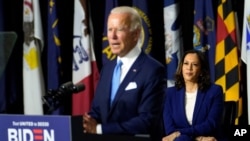The Democratic Party’s proposed platform criticizes China’s trade practices, proposes less spending on national defense, and opposes “forever wars” as it seeks to lay out the party’s foreign policy goals and highlight differences with President Donald Trump.
The 80-page platform, which is to be adopted at the Democratic convention this week, is largely symbolic because the presumptive Democratic nominee Joe Biden does not have to endorse its positions. However, the platform provides an official outline of the party’s vision and policy priorities.
It was crafted by a panel of Democratic leaders, including Biden’s last remaining challenger for the Democratic nomination, Senator Bernie Sanders, and seeks to bridge the gap between the party’s progressive wing that includes Sanders, and Biden’s more moderate approach. The proposed platform maintains the broad policy priorities of Biden, who is expected to accept the Democratic nomination Thursday from his home state of Delaware.
China criticism
China has become one of the central foreign policy issues in the 2020 presidential race, heightened by President Donald Trump’s trade war with the country as well as the coronavirus pandemic, which originated there.
In their party platform, Democrats took a strong stance against China’s trade policies and sought to portray Trump’s efforts against the country as not tough enough.
“Unlike President Trump, we will stand up to efforts from China and other state actors to steal America’s intellectual property and will demand China and other countries cease and desist from conducting cyberespionage against our companies,” the draft platform reads.
The platform also criticizes billions of dollars of tariffs Trump imposed on Chinese goods in an effort to negotiate a trade deal with China, calling his trade policies “reckless” and saying they hurt American farmers.
Trump has sought to confront China on a number of issues, including trade, currency manipulation, and China’s military aggressiveness in the South China Sea. He has also said China must be held accountable for the coronavirus pandemic. The United States and China signed the first phase of a trade deal in January, but negotiations on a second phase have stalled.
Biden has criticized China’s “abusive” trade practices along with its human rights record. He has stressed the need to work with international allies to counter China.
International alliances
Charles Stevenson, a professor of American foreign policy at the Johns Hopkins University School of Advanced International Studies (SAIS), argues that the most significant foreign policy difference between Trump and Biden is that “Trump has practiced an assertive unilateralism” while Biden has made clear he wants to return to an “international, cooperative, pro-alliance” model of diplomacy that was prominent in previous administrations.
Trump has approached foreign diplomacy much differently than most past presidents, publicly questioning the value of international alliances and organizations, including the North American Treaty Organization, the World Trade Organization and the World Health Organization.
The Democratic Party devotes several pages of its platform to the topic of international alliances. It accuses Trump of having “attacked the sources of our strength, hollowed out American diplomacy, shredded international commitments, weakened our alliances, and tarnished our credibility.”
It promises to repair what it sees as broken relationships with governments across the world, including in Europe and Africa. On Africa, it accuses the Trump administration of treating the continent with “neglect and contempt.”
Biden has focused many of his foreign policy plans on rebuilding close relationships with allies and cooperating with international institutions.
Defense and troop levels
The Democratic platform calls for reducing military spending, a sharp contrast to Trump, who has championed an increase in defense spending and has warned that Democrats will weaken the military.
“We can maintain a strong defense and protect our safety and security for less,” the platform reads, calling for annual audits of the Pentagon and an end to what the party sees as the department’s “waste and fraud.”
The platform also calls for bringing “forever wars to a responsible end.”
Both Biden and Trump have promised to decrease U.S. troop levels overseas.
Trump has reduced troop levels in Afghanistan to 8,600 from about 12,000 as part of a U.S.-Taliban deal signed earlier this year. In June, he announced that he would reduce U.S. troop levels in Germany by 9,500 from a total of 34,500. However, Trump has struggled to fulfill a 2016 campaign promise to reduce overall U.S. troop deployments overseas.
Kyle Kondik, a political analyst at the University of Virginia, says the Republican Party has routinely been seen as more hawkish than the Democratic Party, but said an argument can be made that Trump was less hawkish than his Democratic challenger in 2016, Hillary Clinton, who was criticized for her vote in favor of the Iraq war. Kondik said the same case could be made by Trump against Biden, who also voted in favor of the Iraq war when he was a senator.
On Yemen, the Democratic platform calls for ending support for the Saudi-led war in that country. And on Iran, it rejects “regime change” as a U.S. policy goal there.
November election
While foreign policy issues can lead to fierce debates between the parties, they seldom are a top issue for U.S. voters.
“Given the pandemic, they are even less likely to have an impact” on this year’s election, Stevenson said.
The economy was ranked the most important issue in an August poll by the Pew Research Center, with 79% of registered voters saying it was very important to their vote. The next top issues were health care and Supreme Court appointments. Foreign policy issues ranked sixth on the list, with 57% of registered voters saying it was very important to their vote.





